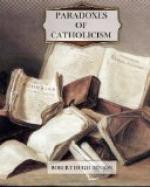Here, then, is the Paradox, and here are two characteristics of the Catholic Church: that she is at once too meek and too self-assertive, too gentle and too violent. It is a paradox exactly echoed by our Divine Lord Himself, Who in the Upper Chamber bade His disciples who had no sword to sell their cloaks and buy them, and Who yet, in the garden of Gethsemane, commanded the one disciple who had taken Him at His word to put up the sword into its sheath, telling him that they who took the sword should perish by it. It is echoed yet again in His action, first in taking the scourge into His own Hand, in the temple courts, and then in baring His shoulders to that same scourge in the hands of others. How, then, is this Paradox to be reconciled?
II. The Church, let us remind ourselves again, is both Human and Divine.
(i) She consists of human persons, and those persons are attached both to one another and to the world outside by a perfectly balanced system of human rights known as the Law of Justice. This Law of Justice, though coming indeed from God, is, in a sense, natural and human; it exists to some extent in all societies, as well as being closely defined and worked out in the Old Law given on Sinai. It is a Law which men could have worked out, at any rate in its main principles, by the light of reason only, unaided by Revelation, and it is a Law, further, so fundamental that no Revelation could conceivably ever outrage or set it aside.
At the coming of Christ into the world, however, Supernatural Charity came with Him. The Law of Justice still remained; men still had their rights on which they might insist, still had their rights which no Christian may refuse to recognize. But such was the torrent of Divine generosity which Christ exhibited, so overwhelming was the Vision which He revealed of the supernatural charity of God towards men, that a set of ideals sprang into life such as the world had never dreamed of; more, Charity came with such power that her commands actually overruled in many instances the feeble claims of Justice, so that she bade men henceforward to forgive, for example, not merely according to Justice, but according to her own Divine nature, to forgive unto seventy times seven, to give good measure, heaped up and running over, and not the bare minimum which men had merely earned.
It was from this advent of Charity, then, that all these essentially Christian virtues of generosity and meekness and self-sacrifice sprang which Nietsche condemned as hostile to material progress.




